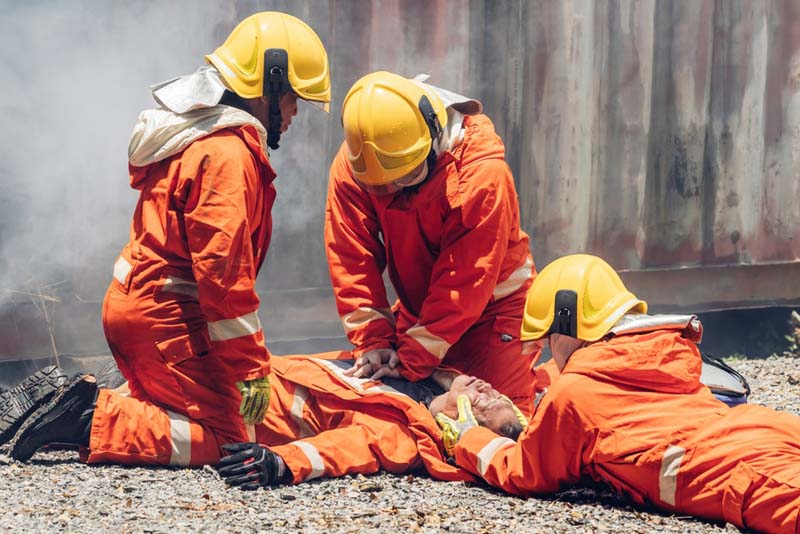Extreme heat, wildfire smoke, and air quality emergencies are just some of the environmental hazards that are making California workers more at risk of getting sick or hurt on the job. Climate change has made these risks worse. Record-high temperatures and longer wildfire seasons have made outdoor workers and workers in buildings without good environmental controls face threats they have never faced before.
Knowing your rights to workers’ compensation for heat illness, smoke exposure, and other environmental injuries protects workers who get sick or hurt at work from hazards in the environment. California law fully protects workers from getting sick at work because of environmental factors. It also has specific rules that say employers must stop deaths and injuries caused by heat.
Since 2011, ODG Law Group has helped workers in Los Angeles County who have had heat stroke, breathing problems from smoke exposure, and other environmental occupational illnesses get all the medical care and benefits they are entitled to under California workers’ compensation law.
California’s Environmental Hazards That Affect Workers
Climate-related dangers pose serious health risks to workers in many fields in California. These risks get worse every year as temperatures rise and wildfire seasons get longer.
Extreme heat and temperatures that are getting higher
Record-high temperatures all over California put outdoor workers at risk of heat illnesses that could kill them. Inland areas often have summer temperatures over 100 degrees, which makes it dangerous for construction workers, agricultural workers, and landscaping crews.
Heat waves that last for several days in a row make it hard to recover fully between shifts. Workers’ bodies can’t fully recover overnight when the weather is hot for a long time, which raises the risk of getting sick.
Air Quality and Smoke from Wildfires
In California, wildfire seasons now last almost all year, which means that workers are exposed to harmful smoke particles for weeks or months at a time. Workers hundreds of miles away from the fires are affected by bad air quality.
PM2.5 and other particles get deep into the lungs, which can cause breathing problems, heart problems, and make asthma worse. Workers who have to work outside during smoke events are at serious risk to their health.
Hazards in the environment inside
Poor ventilation in warehouses, factories, and stores keeps heat and pollutants inside. People who work in places without good air conditioning or air filtration systems suffer from the weather even though they are indoors.
Chemical exposures and environmental stressors together make health risks worse. Heat makes chemicals off-gas and absorb faster, which makes workers more exposed to toxins.
Workers’ compensation covers illnesses caused by heat.
Heat illness is a serious risk at work that can quickly go from mild discomfort to life-threatening medical emergencies that need to be treated right away.
Exhaustion from heat
Heavy sweating, weakness, cold and clammy skin, a fast but weak pulse, nausea, and fainting are all warning signs. Heat exhaustion needs to be cooled down and rested right away, but if you treat it right away, it usually doesn’t cause permanent damage.
Medical care includes moving to cooler places, drinking more water, and keeping an eye out for signs of heat stroke. If workers get heat exhaustion and can’t work while they recover, they can get workers’ compensation medical care and temporary disability.
Stroke from heat
When body temperature rises above 103 degrees, it can cause confusion, changes in mental state, slurred speech, loss of consciousness, and even organ failure, which can be fatal. Heat stroke is a medical emergency that needs an immediate response.
Brain damage, organ failure, and permanent disabilities are some of the long-term problems that can come from heat stroke. In serious cases, workers’ compensation benefits should be large, including ongoing medical care and payments for permanent disability.
Cramps and heat syncope
When workers pass out or fall, they can get hurt from heat exposure (heat syncope) and painful muscle cramps from not having enough electrolytes. If you get hurt because of a heat-related collapse, you can get full workers’ compensation.
Being dehydrated makes the risks of being in the heat worse. Not having enough water or breaks to drink water increases the chance of getting sick and makes the employer more responsible.
Respiratory Diseases Due to Wildfire Smoke Exposure
Inhaling smoke from wildfires can cause both short-term and long-term lung problems that are considered occupational illnesses when they happen at work.
Acute Breathing Issues
Workers who are exposed to smoke while working may have immediate symptoms like coughing, throat irritation, chest tightness, shortness of breath, and eye irritation. Acute problems usually go away after the smoke clears, but they need to be checked out and treated by a doctor.
Workers with existing respiratory problems who are exposed to smoke can have asthma attacks that could be fatal. Employers must protect workers who are at risk or they will be held responsible for making known conditions worse.
Long-Term Respiratory Problems
Repeated or prolonged exposure to smoke can cause long-term damage to the lungs. If you breathe in smoke at work for a long time, you could get chronic bronchitis, your lungs could work less well, and you could be more likely to get respiratory infections.
Particulate matter can have an effect on the heart and blood vessels, making heart attacks and strokes more likely. Fine particles that get into the bloodstream through the lungs cause health problems all over the body, not just in the lungs.
Cancer and Risks Over Time
Benzene, formaldehyde, and other cancer-causing chemicals are found in wildfire smoke. Firefighters and outdoor workers who are exposed to a lot of smoke have a higher risk of getting cancer and can get workers’ compensation if they do.
California law says that workers who get cancers or chronic conditions from being exposed to harmful substances at work can still file claims for occupational diseases, even if it takes years for the symptoms to show up.
California’s Rules for Preventing Heat Illness
Title 8, Section 3395 of the Cal/OSHA rules says that employers have to do certain things to keep workers from getting heat illness. If they don’t, they can be held responsible for injuries to workers.
Water, rest, and shade are required.
There must always be enough clean drinking water for workers to drink at least one quart per hour during their shifts. Water must be available for free to workers and be close to where they work.
When workers start to feel sick from the heat, they must be able to take breaks in shaded areas. Employers can’t stop or discourage workers from taking breaks to cool off when it’s hot.
When the temperature goes above 80 degrees, there must be shade structures that can cool people down. Workers should be able to take breaks in the shade without having to ask for permission.
Steps for Getting Used to a New Environment
New rules say that workers must be closely watched for the first 14 days of work in high heat. New workers are much more likely to get sick from the heat, so they need to be exposed to it more slowly.
During the first four days of a heat wave, all workers need to be monitored for acclimatization. Even workers who have been doing the job for a long time need time to adjust when the temperature suddenly rises.
Procedures for High Heat
When the temperature reaches 95 degrees, extra protections go into effect. Employers must make sure that there are good ways to observe and communicate, that there are pre-shift meetings about how to avoid heat illness, and that there are plans for what to do in case of an emergency.
Plans for Responding to Emergencies
Medical emergency plans must be made and shared with everyone. All workers should know how to call for help in an emergency and give responders their location.
It is required that supervisors learn how to spot the signs of heat illness and how to put prevention measures in place. If supervisors don’t protect workers from heat hazards, the employer is responsible.
Liability from Employer Violations
If a company doesn’t follow Cal/OSHA’s rules for preventing heat illness or protecting workers from wildfire smoke, they could face strong workers’ compensation claims and civil liability.
Not enough water and rest breaks
When employers don’t provide enough drinking water, they break the law and are responsible for any heat-related illnesses that happen as a result. Workers shouldn’t have to bring their own water or wait for breaks to drink.
Putting pressure on workers to keep going when they are feeling heat symptoms is a violation of their right to take a break. Employers who punish workers for taking breaks to cool off are putting themselves in a lot of trouble.
No protocols for getting used to the weather
Not keeping an eye on new workers or gradually exposing them to heat waves can lead to heat illness that could have been avoided. It is against safety rules for employers to rush inexperienced workers into full production during extreme heat.
No planning for emergency response
When workers show signs of heat illness, a delayed emergency response can turn a situation that could have been saved into a tragedy. Employers who don’t have clear emergency procedures and wait to call 911 could be held responsible for worse outcomes.
Not paying attention to weather warnings
Ignoring heat advisories and not putting in place extra safety measures shows a reckless disregard for the safety of workers. Continuing to work in very hot or polluted air without taking the right steps is a sign of negligence.
Insufficient Monitoring of Air Quality
Not keeping an eye on the Air Quality Index during wildfires makes it impossible to take the right safety measures. When AQI levels show that conditions are unhealthy, employers must check them and put protections in place.
Not having respiratory protection when the AQI is too high is against safety rules for workers. When the air quality gets bad enough, people should be given N95 masks or respirators.
A Step-by-Step Guide to Filing Workers’ Compensation Claims for Environmental Hazards
To make an environmental occupational illness claim, you need to show that the conditions at work caused or greatly contributed to your medical problems.
1. Tell your boss right away if you’re sick.
As soon as you notice any signs of heat, smoke, or other environmental hazards, tell your boss. Sending an email with written notice of report dates keeps track of them and stops insurance companies from arguing about when they happened. California law says that you have to report a work-related illness within 30 days of finding out about it.
2. Get medical help right away
If you have symptoms of an environmental illness, see a doctor for an evaluation and treatment. Tell your doctors about your job’s exposure to heat, smoke, or other dangers. Doctors need all the information they can get to correctly diagnose work-related illnesses and keep track of them.
3. Record the conditions at work
If you can, keep track of the temperatures, air quality, and other environmental conditions during your shifts. Take pictures of not having enough shade, water, or safety gear. Records from the weather service and AQI data support claims of workplace hazards.
4. Find Coworkers Who Have the Same Symptoms
When a lot of workers get sick from the same conditions, it makes the case stronger that the workplace caused the problems. Get in touch with other employees who were affected and can confirm that the conditions were dangerous.
5. Tell Cal/OSHA about any violations
If Cal/OSHA fails to protect you from heat illness or wildfire smoke, you can file a complaint with them. Violations of rules help workers’ compensation claims and keep other workers safe from the same dangers.
6. Keep detailed records of your symptoms.
Keep a daily record of your symptoms, how bad they are, and how they affect your ability to work. When insurance companies question medical care, keeping track of how symptoms get worse can help prove how serious the illness is and why treatment is needed.
7. Keep all medical records safe
Keep track of records from visits to the emergency room, the hospital, the doctor, a specialist, and treatments that were prescribed. Full medical records show how sick someone is and how much the treatment will cost.
8. Keep track of your work schedule and exposure.
Write down the days, times, and conditions when you were around heat or smoke. Time records that show work done on days with very high temperatures or bad air quality show that there is a link between the two.
9. Get Statements from Witnesses
Coworkers can confirm dangerous situations, like not having enough water or shade, or a supervisor not following safety rules. Witness testimony bolsters claims when employers refute the existence of a condition.
10. Talk to Workers’ Compensation Lawyers
If your employer denies your claim, says it isn’t work-related, or doesn’t give you the benefits you need, get in touch with experienced lawyers. When insurance companies fight claims of environmental illness, having a lawyer is very important.
Benefits for Environmental Occupational Illnesses
California’s workers’ compensation program offers full benefits for heat illness, injuries from smoke exposure, and other environmental work-related conditions, no matter how bad or long-lasting they are.
Coverage for Medical Treatment
All necessary care is covered, such as emergency treatment, hospitalization, specialist consultations, medications, respiratory therapy, cardiovascular treatment, and ongoing monitoring for chronic conditions.
When necessary to keep an illness from coming back or getting worse, doctors may prescribe preventive gear like cooling vests or respiratory protection that may be covered.
Benefits for temporary disability
During recovery periods when illnesses keep you from working, wage replacement pays two-thirds of your average weekly wages. Temporary disability lasts until you get the best medical care possible or go back to work.
Partial disability benefits are available when employees come back to work but can’t do all of their normal duties or hours. Partial temporary disability pays for lost wages due to a reduced ability to work.
Compensation for Permanent Disability
If you have permanent disabilities because of severe heat stroke, chronic respiratory problems, or damage to your heart, you should get permanent disability benefits. The amount of money you get depends on the ratings given after you reach maximum medical improvement.
Coverage is available for future medical care for long-term conditions. Environmental exposures that cause chronic respiratory problems or organ damage need to be treated for the rest of the workers’ lives.
Death Benefits for Heat-Related Deaths
People who die from heat stroke or other environmental dangers leave behind dependents who can get death benefits. When someone dies at work, their spouse and children get money to cover burial costs and ongoing support.
Common Questions About Claims for Environmental Hazards
Q: Can I get workers’ compensation for heat exhaustion?
A: Yes, workers’ compensation covers all heat-related illnesses that happen at work, such as heat exhaustion, heat stroke, heat cramps, and heat syncope. Employers must pay for medical care and give temporary disability if someone can’t work because of heat illness.
Q: What if my boss says the heat or smoke wasn’t that bad?
A: Weather service records, Air Quality Index data, and medical records show environmental conditions, even if the employer disagrees. Even if employers say there were no problems, objective evidence of dangerous conditions backs up claims.
Q: Do I have to show that my boss broke Cal/OSHA rules?
A: No, you don’t need to show that you broke any rules to get workers’ compensation benefits. However, documented violations make claims stronger and may lead to more penalties for employers who don’t follow safety rules.
Q: Can I get benefits for long-term breathing problems caused by being around smoke a lot?
A: Yes, workers’ compensation covers cumulative trauma from repeated exposures at work. You have to show that your job had a big part in the development of your condition, but chronic illnesses caused by hazards in the workplace are covered.
Q: What if I already had asthma and it got worse because I was around smoke at work?
A: Workers’ compensation pays for worsening of pre-existing conditions. You can get benefits for the work-related aggravation if being around smoke at work made your asthma worse or caused attacks that needed treatment.
Q: How long do I have to tell my boss about an illness caused by the environment?
A: California law says that you have to report work-related illnesses within 30 days of finding out they are work-related. If your condition started slowly, the 30-day period starts when you should have reasonably known that it was related to your job.
Q: Can I lose my job if I file a claim for heat illness or smoke exposure?
A: No, California law says you can’t punish workers who file workers’ compensation claims. Employers who fire, demote, or otherwise punish workers for reporting work-related illnesses could face serious legal problems.
For more information on environmental workplace safety, see
For more information about environmental hazards at work and how to protect workers, go to:
Cal/OSHA has rules for preventing heat illness and protecting people from smoke from wildfires.
California Division of Workers’ Compensation: How to file a claim and get benefits
AirNow.gov shows you the real-time Air Quality Index for different parts of California.
Take care of your health and your legal rights.
Extreme heat and wildfire smoke are two examples of environmental hazards that can cause serious work-related illnesses that should be fully covered by workers’ compensation. Don’t let employers deny claims just because they didn’t provide enough protections or because the symptoms came on slowly instead of all at once.
We’ve helped workers in Los Angeles County get benefits for illnesses caused by heat, smoke exposure, and other environmental work conditions at ODG Law Group. Since 2011, we’ve been working to make sure that injured workers in California get all the medical care and money they are owed by law. We know how to prove that the conditions at work caused or greatly worsened your health problems, and we know how complicated medical issues can be.
If you’ve gotten sick from the heat, smoke from wildfires, or other environmental injuries at work and your employer won’t pay or is taking too long to pay, call ODG Law Group at (818) 975-3080 for a free consultation. Our skilled staff can help you in English, Spanish, and Armenian. We will make sure you get the medical care and benefits you deserve, and we will hold employers responsible for not keeping you safe from environmental hazards.




